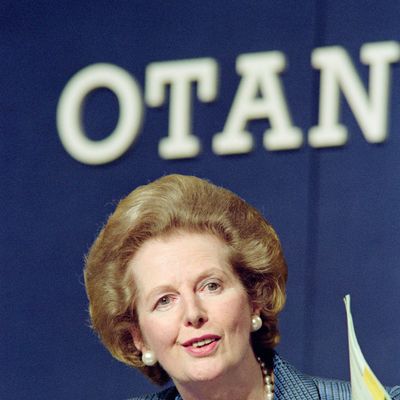
In memorializing Margaret Thatcher’s death today, many more knowledgeable analysts are dissecting Thatcher’s foreign and economic policy legacy, both in service of praise and condemnation. But however people remember the Baroness, there is one decision that most people agree she got right: fighting to keep Britain out of the Euro and maintain the Pound Sterling as the nation’s sole currency.
Thatcher’s opposition to the Euro is a fairly unassailable position these days, given how inept the Eurozone has proven itself to be when it comes to dealing with the economic crises in Greece, Italy, and Spain, and most recently in Cyprus. And it’s tempting to credit Thatcher (as Joe Weisenthal has done) with having seen the Euro’s problems coming years in advance.
But I’m not sure it’s that simple. This morning, I rewatched Thatcher’s famous “No, No, No” speech to the U.K.’s House of Commons in 1990, in which she voiced her objection to a European currency union. And while she was right, in hindsight, that joining the Euro (or, as it was called then, the ECU) would be a mistake for the U.K., her biggest reasons for opposing it didn’t end up being the correct ones.
First, watch the speech. It’s notable, not just for the accents and funny parliamentary customs, but for the argument Thatcher is making against an attempted consolidation of powers by the European Parliament.
“It is our purpose to retain the power and influence of this House,” she said, speaking of the U.K.’s parliament, “and not to dilute it of many of its powers.”
Thatcher’s primary case against the ECU was a nationalistic slippery-slope argument. She believed that, if the European Parliament were given control of a common currency, it would gradually “extend its powers and competence” into other areas — like health, national security, tax policy, and social issues. She called the proposal for a stronger European Parliament “a backdoor to a federal Europe” that would eventually replace England’s entire political system with a gooey mess of pan-European policy and culture.
“It was said … by my Chancellor of the Exchequer that this was not really about monetary policy at all, it was really about a federal Europe taking many democratic powers away from democratically-elected bodies to non-elected ones,” she told the House of Commons that day. “I fervently believe that that is true, which is why I will have nothing to do with their definition of economic and monetary union.”
Of course, we know now that the creation of the Euro didn’t lead to the total dissolution of national sovereignty. The problem with the Euro, quite simply, is that it created a currency union but not a banking or a fiscal union — a situation that has taken away many of the policy tools required to deal with economic crises and created permanent tensions between rich EU states and poorer ones. The issue, in short, is not that the Euro consolidated powers, but that it didn’t consolidate enough of them.
As Weisenthal notes, Thatcher also had arguments to that effect, which she included in her 1993 and 1995 autobiographies. And in a portion of her “No, No, No” speech that isn’t included in that YouTube video (but is viewable as text here), she did augur some of the political problems a European currency union would face. (For one: “The dominant voice, the predominant voice, on any central bank would be the German voice.”)
But it’s clear, from watching her make her case in 1990, that Thatcher’s primary objection to a unified European currency was based in a fear of foreign control, not worries about the political stability of a currency union. So, while her decision was correct in hindsight, let’s not give her too much credit for forecasting the Euro’s troubles.





























